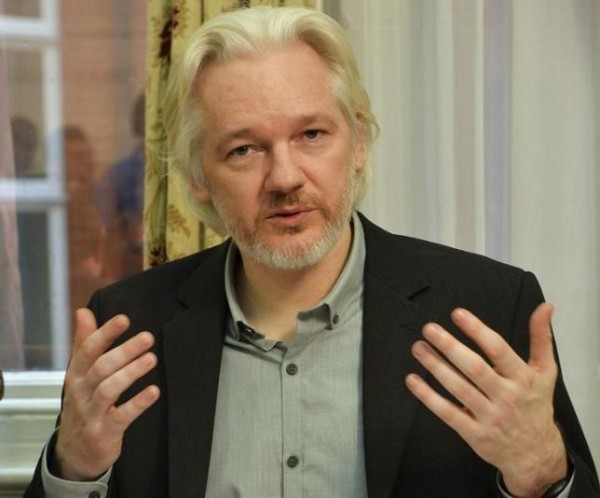
“WikiLeaks founder Julian Assange has been arbitrarily detained by Sweden and the United Kingdom since his arrest in London on 7 December 2010,” the United Nations Working Group on Arbitrary Detention ruled.
The panel also said that Assange’s detention “should be brought to an end, that his physical integrity and freedom of movement be respected, and that he should be entitled to an enforceable right to compensation.”
Assange, who enraged the United States by publishing hundreds of thousands of secret US diplomatic cables, has been holed up in the embassy since 2012 to avoid a rape investigation.
The former computer hacker has denied allegations of a 2010 rape in Sweden, saying the charge is a ploy that would eventually take him to the United States where a criminal investigation into the activities of WikiLeaks is still open.
The Swedish government rejected the UN panel’s conclusion, arguing that Assange had voluntarily chosen to stay at the embassy.
“Swedish authorities have no control over his decision to stay there. Mr. Assange is free to leave the embassy at any point,” it said a statement on Friday.
Britain also disagreed with the UN panel, saying it planned to contest the ruling.
“This changes nothing. We completely reject any claim that Julian Assange is a victim of arbitrary detention. The UK has already made clear to the UN that we will formally contest the working group’s opinion,” a government spokesman said.
Both governments have previously said they would not be bound by the panel’s ruling.
But Assange, 44, said in a short statement posted on Twitter: “Should I prevail and the state parties be found to have acted unlawfully, I expect the immediate return of my passport and the termination of further attempts to arrest me.”
He had said that if he lost the appeal then he would leave his cramped quarters at the embassy in the Knightsbridge area of London, though Britain said he would be arrested and extradited to Sweden as soon as he stepped outside.
The decision in his favour marks the latest twist in a tumultuous journey for Assange since he incensed Washington with his leaks that laid bare often highly critical US appraisals of world leaders from Vladimir Putin to the Saudi royal family.
Assange: I will accept arrest by British police on Friday if UN rules against me. More info: https://t.co/Mb6gXlz7QS pic.twitter.com/mffVsqKj5w
— WikiLeaks (@wikileaks) February 4, 2016
Stepping out?
While the ruling may draw attention to Assange’s fate, it is unlikely to immediately affect the current investigations against him.
The UN panel does not have the authority to order the release of a detainee, but it has considered many high-profile cases and its backing carries a moral weight that puts pressure on governments.
Recent high-profile cases submitted to the UN panel include that of jailed former Maldives President Mohamed Nasheed, represented by Amal Clooney, and of Washington Post reporter Jason Rezaian, an Iranian-American jailed in Iran until a prisoner swap last month.
But governments have frequently brushed aside its findings such as a ruling on Myanmar’s house arrest of opposition leader Aung San Suu Kyi in 2008, a call in 2008 for the Iraqi government not to hang former dictator Saddam Hussein, and frequent pleas for the closure of the US military prison at Guantanamo Bay.
“We have been consistently clear that Mr Assange has never been arbitrarily detained by the UK but is, in fact, voluntarily avoiding lawful arrest by choosing to remain in the Ecuadorean embassy,” a British government spokeswoman said.
Enemy of the state?
Swedish prosecutors said the UN panel’s decision had no formal impact on the rape investigation under Swedish law. A US Grand Jury investigation into WikiLeaks is ongoing.
White House spokesman Josh Earnest said it was unclear what impact “a pronouncement from the United Nations would have on the situation.”
“But, you know, but he’s facing serious charges inside of Sweden,” Earnest said.
Assange said that he had been deprived of fundamental liberties including access to sunlight and fresh air, adequate medical facilities and legal and procedural security.
Since he sought refuge in the small embassy, British media have reported Assange has suffered from an irregular heartbeat, a chronic cough and high blood pressure.
Assange made international headlines in early 2010 when WikiLeaks published classified US military video showing a 2007 attack by Apache helicopters that killed a dozen people in Baghdad, including two Reuters news staff.
Later that year, the group released over 90,000 secret documents detailing the US-led military campaign in Afghanistan, followed by almost 400,000 internal US military reports detailing operations in Iraq.
More than 250,000 classified cables from US embassies followed, then almost three million dating back to 1973.
(FRANCE 24 with AFP, REUTERS)

Leave a Reply
You must be logged in to post a comment.